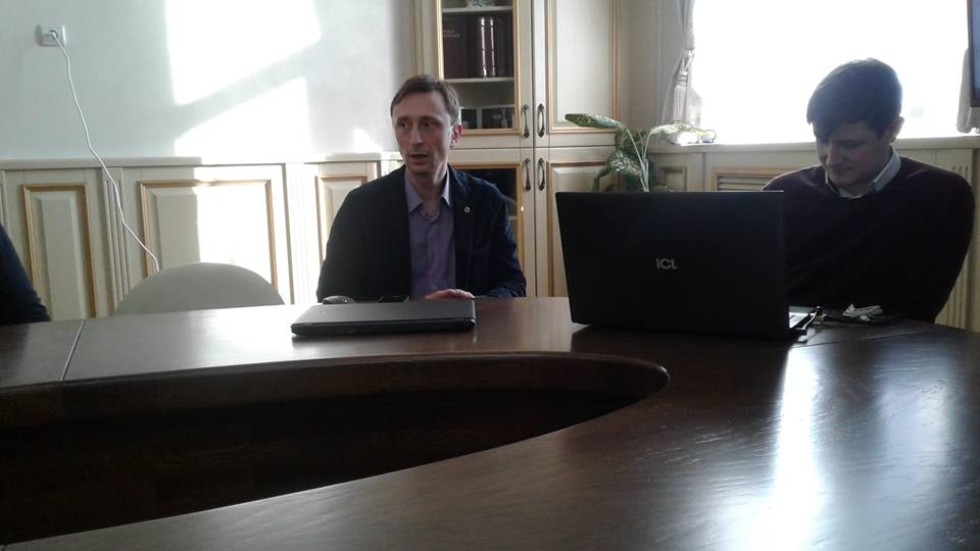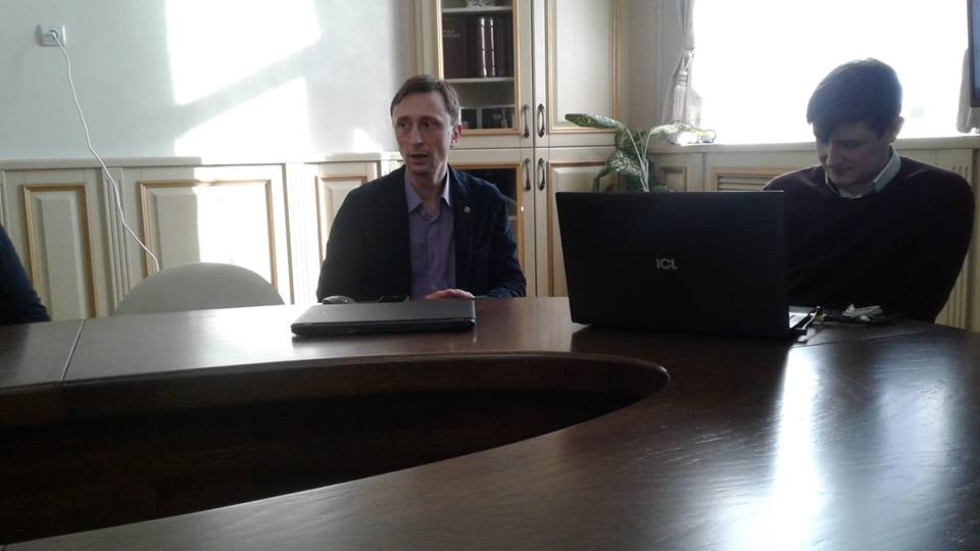12 апреля 2018 г. академический координатор Центра превосходства Жана Монне в области европейских исследований VOICES+, д.ю.н. Р.Ш.Давлетгильдеев принял участие в митап-семинаре ИМОИВ КФУ по теме влияния миграции на экономику принимающих стран / On the 12th of April 2018 Academic Coordinator of the Jean Monnet Excellence Centre in European Studies VOICES+, Doctor of Law R.Sh.Davletgildeev participated in the meet up-seminar at the Institute of International Relations of KFU
12 апреля академический координатор Центра превосходства Жана Монне в области европейских исследований VOICES+, д.ю.н. Р.Ш.Давлетгильдеев принял участие в митап-семинаре, посвященном влиянию миграции на экономику принимающих стран, организованном НОЦ европейских исследований ИМОИВ КФУ.
С первой встречи круг участников митап-серии существенно расширился. Ключевым спикером выступила директор чистопольского филиала КНИТУ-КАИ, заведующая кафедрой экономики и управления Анна Свирина. КФУ представляли директор НОЦ «Европейские исследования», модератор дискуссии Лилия Иликова, заместитель директора ИМОИиВ по научной деятельности Раиль Фахрутдинов, заместитель декана юридического факультета по международной деятельности, директор НОЦ прав человека, международного права и проблем интеграции юридического факультета КФУ Рустем Давлетгильдеев и доцент кафедры общей и этнической социологии Алла Шакирова. Кроме того, в дискуссии был задействован доцент кафедры биохимии и клинической лабораторной диагностики КГМУ Алексей Набатов.
Разговор строился вокруг обозначенной темы, а также поддерживался стремлением развенчать мифы о миграции. Так, как известно, один из мифов о миграции, носящий экономический характер, гласит, что мигранты дают импульс развитию рынка труда, отметила Анна Свирина, начиная беседу. Однако на деле все гораздо сложнее, каждая ситуация уникальна. Ведь если речь идет не о дешевой рабочей силе в лице нелегальных мигрантов, то на работодателя ложится большая нагрузка, связанная с официальным оформлением всех необходимых документов для принятия на работу гражданина другого государства. В ряде случаев мигранты влияют на рост экономики положительно, в других же – нет, все зависит от исходных условий и большого числа переменных.
Еще одним мифом, о котором говорили в рамках митапа, стало распространенное суждение о том, что рост миграции приводит к росту преступности. Прямой корреляции по данному вопросу до сих пор не выявлено в большинстве государств. Третий же миф, отчасти связанный со вторым, отражает восприятие коренным населением мигрантов как некой целостной массы, крупных потоков. К примеру, многие продолжают упорно считать, что мигранты это, прежде всего, дешевая рабочая сила, забывая при этом о наличии среди мигрантов так называемых «экспатов» – высококлассных специалистов в той или иной области, которых в страну приглашают на работу. Да и в целом мигранты очень сильно различаются и по социальному статусу, и по уровню образования и по уровню достатка.
К слову, как отметил в ходе дискуссии Рустем Давлетгильдеев, существует множественное деление мигрантов на категории: трудовые мигранты, мигранты в статусе профессиональных специалистов, вынужденные переселенцы, военные беженцы, беженцы - искатели убежища. Прежде всего, мигранту по прибытию на новую родину, необходимо определить свой статус, ведь от этого во многом будет зависеть его дальнейшее пребывание на территории государства, наличие пособия и его размер. Эта процедура сильно осложняется, когда увеличиваются потоки мигрантов – приходится в сжатые сроки проводить классификацию гораздо большего количества человек, нежели обычно, и это зачастую становится серьезным вызовом для принимающего государства.
Обсуждали сегодня и бюрократизацию процедуры отбора мигрантов в страны ЕС. Заходила также тема восприятия новых мигрантов мигрантами прежних волн, уже успевших пройти процесс интеграции в новое сообщество: поддерживают ли они вновь прибывших, уделяют ли им внимание, стремятся ли помочь пройти трудный процесс адаптации и влияют ли прежние мигранты на новые – эти вопросы в разрезе разных государств интересовали Раиля Фахрутдинова. Как отметила Анна Свирина, все индивидуально и зависит от страны и этнической группы мигрантов. Так, например, в Бельгии вновь прибывающие мигранты наоборот влияют на образ мышления прежних.
В свою очередь, Алексей Набатов разбирал отношение к мигрантам у коренного населения на примере Нидерландов и анализировал самочувствие мигрантов, проживающих в этой стране. Как оказалось, голландцы довольно толерантны в отношении к мигрантам, правда влиться в жизнь небольшого города бывает трудно. Однако когда удается это сделать, то происходит взаимообразное влияние коренного населения и мигрантов.
В Германии же, коренное население большое внимание уделяет процессу адаптации мигрантов, стремясь его ускорить и сделать максимально комфортным. Так, по рассказу Аллы Шакировой, немцы большое значение придают работе с детьми мигрантов, как с подрастающим новым поколением. А Анна Свирина отмечала, что в Германии действуют специальные программы интеграции мигрантов посредством вовлечения их в культурную жизнь того или иного города. А вот венгерцы, напротив, очень категорично настроены по отношению к мигрантам, и эта страна мигрантов практически не принимает.
Надо сказать, в этот раз к участию в митап-семинаре были допущены не только специалисты, но и заинтересованные магистранты профиля "Правовое сопровождение международного бизнеса" Юридического факультета КФУ. Пока они являлись лишь слушателями, однако в дальнейшем планируется полноценно подключать их к работе митап-серии. Следующая встреча будет посвящена анализу целесообразности тех или иных бюрократических процедур, связанных с определением и соблюдением критериев допуска мигрантов в то или иное государство.
On the 12thof April 2018 Academic Coordinator of the Jean Monnet Excellence Centre in European Studies VOICES+, Doctor of Jurisprudence R. Davletgildeev participated in the meet up-seminar at the Institute of International Relations on the topic of the impact that migration has on the economy of receiving countries.
Compared to the first meeting the circle of the meet up series got significantly broader. The key speaker was the Director of Chistopol branch of KNRTU – KAI, Head of the Department of Economics and Management Anna Svirkina. KFU was represented by the Director of RES “European research”, discussion moderator Lilia Ilikova, Vice Director of the Institute of International Relations for scientific activity Rail Fakhrutdinov, Vice Dean of the Faculty of Law for international activity, Director of the RES of human rights, international law and challenges of integration of the Faculty of Law in KFU Rustem Davletgildeev and assistant professor of the Department of General and Ethnic Social Studies Alla Shakirova. Besides, assistant professor of the Department od Biochemistry and Clinical Laboratorial Diagnostics in KSMU Alexey Nabatovwas involves in the discussion.
The conversation was based around the given topic and was supported by a common motivation to dispel the myths surrounding migration. As it is known, one of the myths about migration, which bares economic nature, implies that migrants add impetus to the development of the labor market, this observation was made by Anna Svirkina during the opening of the discussion. However, in practice everything is much more complicated and every situation is unique. If it doesn't come to cheap labor force represented by illegal migrants, employers experience great pressure, connected to official formalization of all of the necessary documents to employ a foreign national. In a number of cases migrants do impact the economic growth positively, in other number – they don't, everything depends on initial conditions and amount of variables.
Another myth, which was discussed during the meet up, is based on a popular belief in that the growth of migration leads to growth in crime. Direct correlation on that motion is still to be found in most countries. The third myth, partly connected to the second one, reflects indigenous population's perception of migrants as a sort of a holistic mass, large influxes. For example, many still persist on thinking that migrants are firstly a cheap labor source, when forgetting about the existence among migrants of so called “expats” – high class specialists in a particular field, who are invited to the country for work. In general, migrants very much vary in social status, levels of education and wealth.
As it was noted by Rustem Davletgildeev, in the course of the discussion, there are multiple basis for categorization of migrants: labor migrants, migrants with a status of professional specialists, internally displaces persons, military refugees, asylum seeking persons. First and foremost, upon arriving of a migrant to their new home it is important to define their, as it will be something on which the further stay on the territory of the state, the presence of allowance and its amount is dependent on. This procedure gets much more complex, when the migrant influxes get larger – classification in shortened periods of a much bigger amount of persons is required and it often becomes a serious challenge to receiving societies.
Bureaucratization of the migrant selection procedure to the EU was discussed today. The issue of perceiving of new migrants by migrants on previous generations, who have already undergone the process of integration into the new community was raised. Do they support newcomers, do they pay attention to the latter, do they strive to help to undergo the difficult adaptation process and do previous migrants impact new ones? Those questions in the spectrum of different countries were a matter of interest to Rail Fakhrutdinov. As it was pointed put by Anna Svirkina, everything is to judged individually and depends on the country and the ethnic group of migrants. For example, in Belgium new coming migrants rather have an impact on the way of thinking of the previous.
Alexey Nabatov analyzed the attitude of the indigenous population towards migrants using Netherlands as the example and the well-being of migrants, who live in the country. As it turned out to be, the Dutch are quite tolerant to migrants, but infiltrating the city life might be difficult. But when it is successfully done, there are examples of various ways both indigenous population and migrants mutually influence each other.
In Germany indigenous population pays great attention to the migrants' adaptation process, strives for it to be quicker and comfortable to the fullest extent possible. As it was put by Alla Shakirova, the German attach great importance to work with the children of migrants and their youth. Alla Svirkina noted, that in Germany there are special programs for migrant integration based no their involvement into the cultural life of a city. On the other hand, the Hungarian are very opposed to migrants and the country almost doesn't receive migrants at all.
It is important to note, that not only specialists were allowed to participate in the meet up – seminar, but also the students of the master's degree program “Legal support of international business” of the Faculty of Law in KFU. For now, they were audience members, but it is planned to involve them into the work of the meet up series further on in the future. Next meeting will be devoted to the analysis of the feasibility of certain bureaucratic procedures, which are connected to determining and satisfying the criteria of migrants' admission to a certain state.


